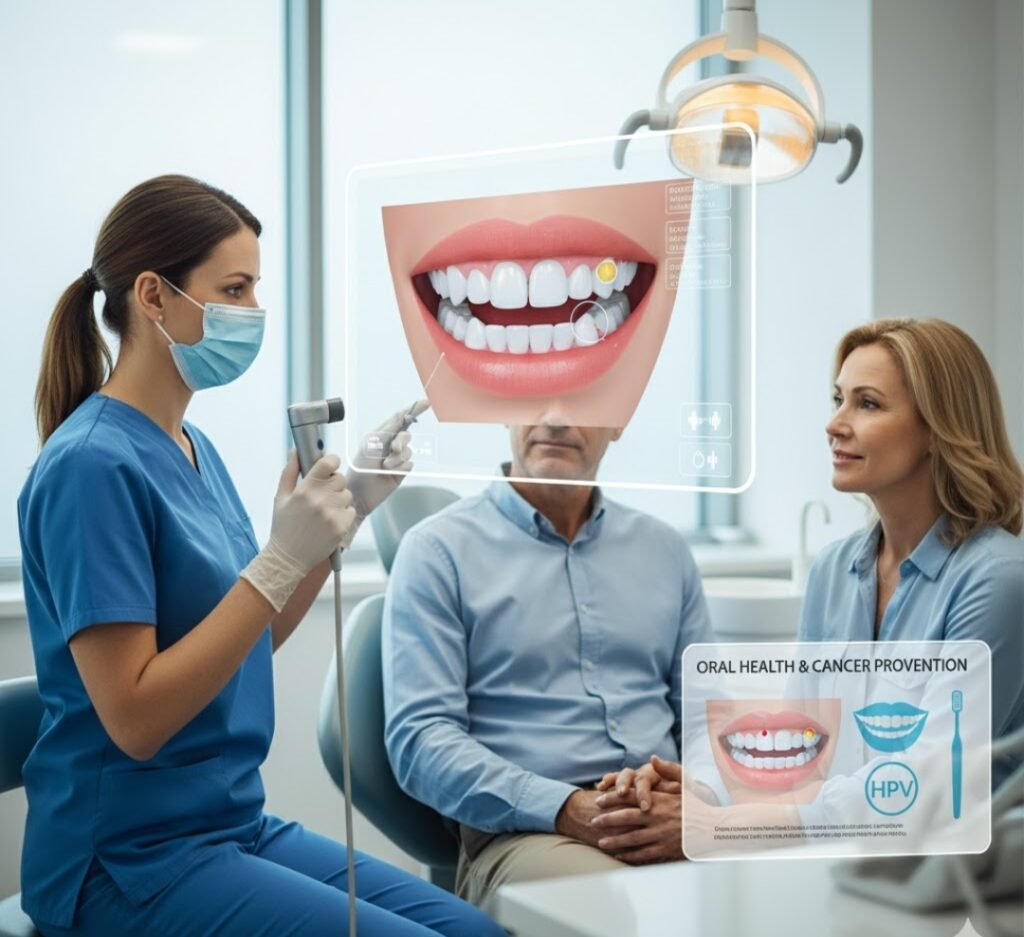When people think of cancer prevention, oral health isn’t always the first thing that comes to mind. Yet, your mouth can often reveal early warning signs of systemic diseases, including cancer. Oral cancer—encompassing cancers of the lips, tongue, cheeks, gums, and throat—is one of the most serious yet preventable conditions your dentist can help detect. Understanding how regular dental care plays a vital role in prevention could be the difference between early detection and delayed diagnosis.
The Overlooked Link Between Oral Health and Cancer
Oral cancer develops when abnormal cells grow uncontrollably in the tissues of the mouth or throat. While its symptoms may seem harmless at first—such as a persistent sore, lump, or patch—these warning signs can be easy to overlook without professional assessment. That’s why maintaining a consistent dental routine is crucial; your dentist isn’t just checking for cavities but also for any subtle tissue changes that could indicate something more serious.
According to health experts, most oral cancers are linked to lifestyle and environmental factors such as tobacco use, excessive alcohol consumption, prolonged sun exposure, and infection with the human papillomavirus (HPV). However, poor oral hygiene and neglecting regular checkups can compound these risks. By keeping your mouth healthy, you create an environment less prone to chronic inflammation and cellular damage—conditions that can contribute to cancer development.
The Role of Your Dentist in Early Detection
Dentists are often the first healthcare professionals to spot the signs of oral cancer. During routine visits, they inspect the soft tissues of your mouth—your gums, tongue, lips, and throat—for any abnormalities. This visual and tactile assessment can identify early-stage lesions before they become visible or symptomatic to you.
A comprehensive oral examination doesn’t just safeguard your teeth—it could save your life. That’s why it’s vital to detect oral cancer early with general examination and hygiene. Regular cleanings allow your dentist to keep track of tissue changes, manage risk factors, and recommend timely investigations if any irregularities arise. The combination of preventive hygiene and professional oversight ensures that even minor concerns are addressed long before they escalate.
Recognizing Early Warning Signs
While your dentist plays a key role, being aware of changes in your mouth helps you take proactive steps between visits. Look out for the following signs:
- Sores or ulcers that don’t heal within two weeks
- Red or white patches on the tongue, gums, or inner cheeks
- Persistent pain, numbness, or difficulty swallowing
- Lumps, thickened areas, or unusual bleeding
- Loose teeth without clear cause
If any of these symptoms persist, don’t delay seeking professional advice. Early intervention dramatically improves treatment outcomes and recovery rates.
How Lifestyle Choices Affect Oral Cancer Risk
Your everyday habits can have a profound impact on your oral and overall health. Smoking remains one of the most significant risk factors for oral cancer, but it’s not the only one. Excessive alcohol use, poor diet, and chronic exposure to UV rays (especially for those working outdoors) all elevate risk.
Moreover, HPV infection—transmitted through intimate contact—has been increasingly linked to throat and tonsil cancers. Good oral hygiene alone cannot eliminate these risks, but it does strengthen your body’s defense mechanisms by reducing chronic irritation, inflammation, and infection.
To further protect yourself, maintain a nutrient-rich diet filled with fruits, vegetables, and antioxidants, which help neutralize free radicals that can damage cells. Staying hydrated also keeps your oral tissues healthy and resilient.
The Importance of Routine Dental Care
Preventive dental care serves as the foundation of long-term oral health. During a professional cleaning, plaque and tartar buildup are removed from areas that brushing and flossing can’t reach. This not only prevents gum disease and tooth decay but also reduces chronic inflammation—a condition linked to several types of cancer.
Many patients underestimate how valuable these visits can be beyond the scope of “cleaning.” They provide your dentist with the opportunity to assess risk, monitor any changes in the soft tissues, and educate you on lifestyle modifications that support oral health.
Raising Awareness for a Healthier Future
Oral cancer awareness begins with education. Many people assume that only smokers or heavy drinkers are at risk, but the reality is that anyone can develop the disease. Understanding your individual risk factors and adopting preventive habits can make a significant difference in long-term health outcomes.
Your dentist’s chair is not just a place for treating toothaches—it’s a vital checkpoint for early disease prevention. Through consistent dental visits, open communication, and mindful habits, you can take control of your oral health and protect yourself from potential threats long before they manifest.
As research continues to shed light on the connection between oral health and systemic diseases, dental professionals are becoming even more integral to holistic healthcare. To better understand the various factors in developing oral cavity and oropharyngeal cancers, it’s important to explore how lifestyle and biological influences can affect your risk. Maintaining your dental appointments and embracing preventive care may very well be one of the most powerful steps you take toward lifelong wellness.
Experienced SEO Specialist and Web Developer with a strong focus on off-page SEO and guest posting. With 3 years of proven expertise, I help businesses improve their search rankings and build sustainable online presence.
